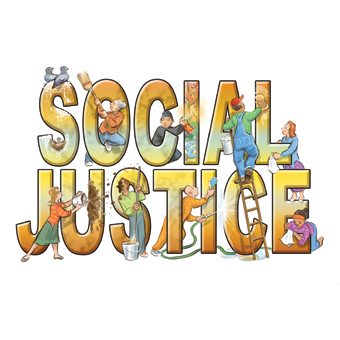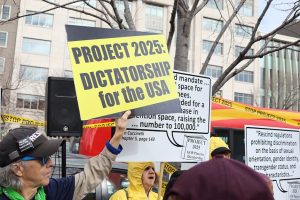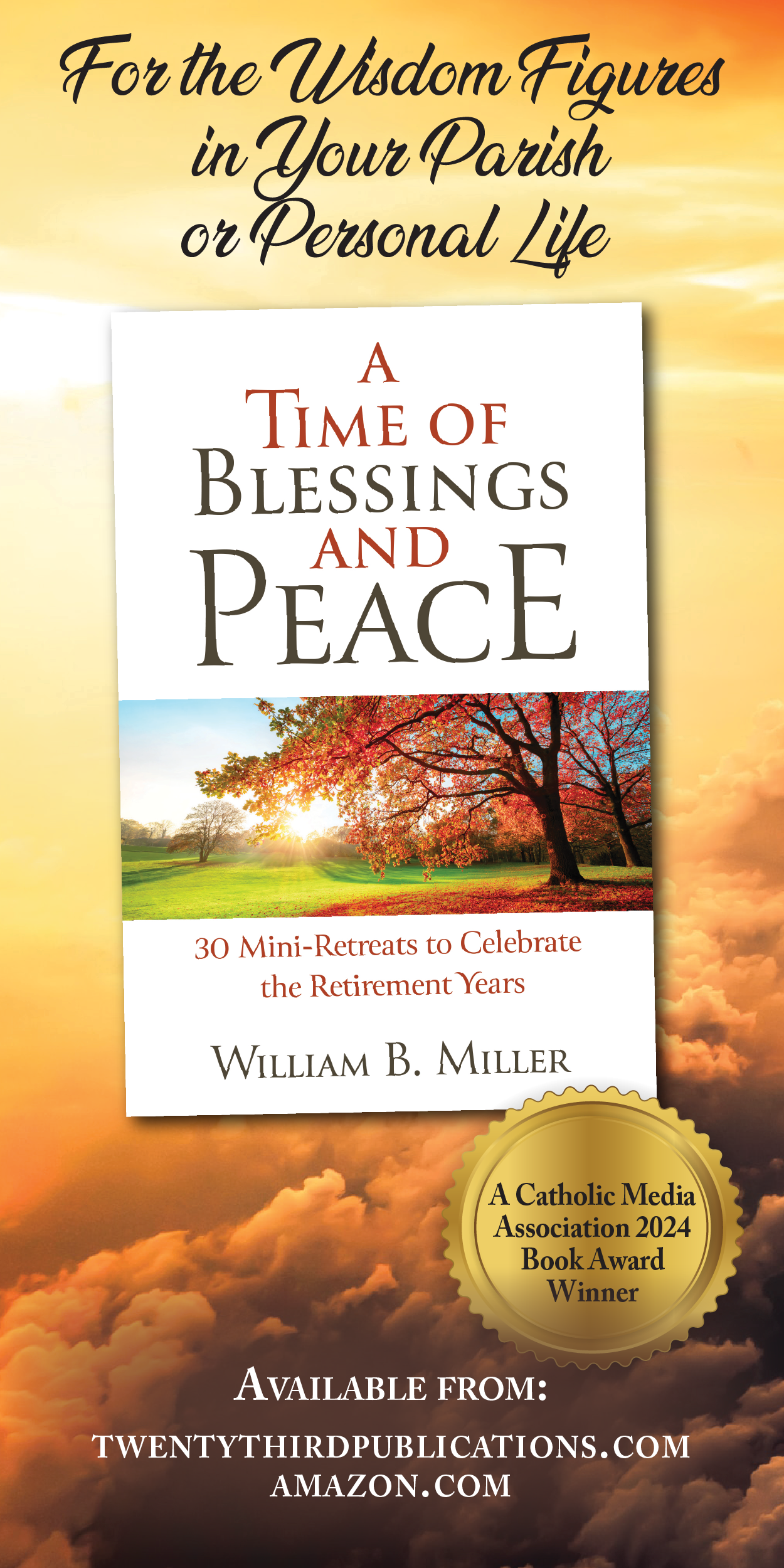Why are some faithful tarnishing the good name of this essential Catholic value?
The do-gooders at Our Lady Queen of Peace Parish in Brodheadsville, Pennsylvania didn’t alarm anyone initially. They formed a social justice committee in 2009, figuring they would help the poor, mostly those in their own rural parish community, south of Scranton in the rolling hills of the Poconos.
The group set up a St. Martin de Porres fund to cover the cost of bereavement dinners for the parish’s needy families—meatloaf and such, nothing extravagant. A subcommittee reaches out to mourning families in the months following their loss. The group sponsors the parish’s pro-life activities and hosts a monthly Sunday supper, which welcomes anyone who’d like to share a meal, donation optional.
Admittedly, with the possible exception of their uncontroversial pro-life work, these are all works of charity rather than true social justice, which works to change the underlying societal structures that cause inequality instead of simply providing material assistance. But the committee still operated under the “social justice” name.
It all seemed innocent enough. But then in March 2010 talk show host Glenn Beck, a former Catholic, urged people to leave their church if it had anything to do with social justice—code, he suggested, for socialism.
Deal Hudson, former director of Catholic outreach for President George W. Bush’s campaigns, concurred, writing, “Glenn Beck hit the nail directly on the head. . . . Social justice and economic justice are code phrases of the religious left who prefer government solutions to human problems funded by the redistribution of wealth.”
Other conservative media personalities defended Beck, taking up the drumbeat against what theologians and everyday Catholics alike might have thought was a well-established aspect of Catholic teaching, making social justice suddenly a highly controversial and politicized term in Catholic circles.
Concerned parishioners at Our Lady Queen of Peace soon lobbied for the social justice committee to change its name to anything but social justice. The pastor asked the group’s members and its critics to democratically resolve the issue.
“It was a chance to educate,” says Father Sean Carpenter, assistant pastor. “The preferential option for the poor is a central teaching of Christ: ‘Whatever you did for one of these least brothers of mine, you did for me.’ We try to meet people where they’re at and bring them closer to what the church teaches.”
The next few meetings of the committee were devoted to spirited debate. Parishioner Dick Dikant led the defense.
“It just kind of frosted me that Glenn Beck said it was socialism, and to walk away from the church,” Dikant says. “So I looked into it.” What Dikant found astonishes him even now. “Even though we’d been reading encyclicals, I hadn’t noticed the term social justice earlier,” he says. “But it’s all over the place. The church is into social justice!”
Dikant mostly quoted Pope John Paul II and Pope Benedict XVI as he made the case that social justice is key to the Catholic faith and therefore acceptable as a committee name. When it came time to vote, the ayes had it—by just one vote. The committee kept its name, but the good-natured Dikant regrets that the parishioner who led the opposition left the parish because of that outcome.
Justice for all
Considering the quarrel over the term social justice—which does appear frequently in encyclicals, the catechism, and canon law—it’s easy to imagine the blow-up that might occur if the parishioners at Our Lady Queen of Peace engaged in actual social justice projects, such as helping to improve conditions for low-income workers or providing better access to affordable housing. Many Catholics, however, still seem uncertain of what social justice looks like in action.
William Droel, author of What is Social Justice? (ACTA) and a pastoral associate at Sacred Heart Parish in Palos Hills, Illinois, narrows the definition of social justice to people working together to transform societal structures for the common good.
A classic example is the apartheid boycott of the 1980s, when college students convinced their schools not to do business with apartheid South Africa and thus played a part in ending that injustice.
In the past, Droel says, Catholics often practiced social justice in guilds and through unions within their occupations. Now, however, working people who want to put their faith into action are told to join the justice and peace committee at their parish or perhaps rehab a house on the weekend with Habitat for Humanity.
“Catholics have bought into the American understanding of religion as being a private thing,” he says. Droel believes the most refreshing thing people can hear is that as Christians they are empowered to be agents of social justice Monday through Friday as well.
In his first encyclical, Deus Caritas Est, Pope Benedict XVI wrote that the church’s role in social justice is to inform the laity and politicians through its teachings; the state and the laity are both responsible for creating conditions that bring about social justice.
Social justice is viewed within the church as a means of creating the conditions necessary for a middle class. Housing, education, and employment are all important elements. Social justice can also look like guaranteed health care, promoting both the common good and individual dignity.
Pope Benedict, in fact, joined the World Health Organization’s demand for universal health care, saying it is an inalienable right, regardless of a person’s ability to pay. Privatized health care, he said, should “not become a threat to the accessibility, availability, and quality of health care.”
Much like police or fire departments, roads, schools, public pensions, health care for seniors, and public water and sewage systems, universal health care is seen as a public good, one that promotes both individual dignity and the best interest of the community.
Protecting those basic needs is at the heart of social justice. As evidence, Bernard Brady, chair of the theology department at the University of St. Thomas in St. Paul, Minnesota and author of Essential Catholic Social Thought (Orbis), points to The Compendium of the Social Doctrine of the Church. The 2004 document of the Pontifical Council for Justice and Peace describes the common good as “the sum total of social conditions which allow people, either as groups or as individuals, to reach their fulfillment more fully and more easily.”
The common good, it adds, demands “above all the commitment to peace, the organization of the state’s powers, a sound juridical system, the protection of the environment, and the provision of essential services to all, some of which are at the same time human rights: food, housing, work, education and access to culture, transportation, basic health care, the freedom of communication and expression, and the protection of religious freedom.”
Taking sides
Criticism of social justice is nothing new. Brady notes that politically conservative American Catholics have always been suspicious of efforts toward social justice, leery of the idea that the government has a responsibility to care for or promote the development of the poor.
Brady recalls that the preeminent voice of American conservatism, the Catholic William Buckley, referred to Pope John XXIII’s 1961 social encyclical Mater et Magistra as a “triviality.” As for Pope John Paul II’s Sollicitudo Rei Socialis, Buckley called it “heart-tearingly misbegotten” with a “Tweedledum-Tweedledee view.”
What may be new, however, is how transparently politics now seems to influence the faith of some Catholics when it comes to debating social justice.
Stephen Phelan, communications manager with Human Life International, has written that “ ‘progressive’ Catholics often seem to think that Jesus was some kind of ‘Che of Nazareth’ who came to establish social justice on earth, and that the gospel and the entirety of church teaching can be reduced to something called the church’s social teaching, which is further reducible to something like the Democratic Party platform.” Those who advocate for social justice are therefore accused of engaging in partisan politics, not practices of faith.
Michael Voris, host of Real Catholic TV, preaches a similar message. His philosophy often resembles Republican Party ideals, including a rousing faith in the free market. He slams Democratic Party efforts, such as working to stop global warming, as sinister, despite the pope himself pledging in 2007 to make the Vatican the world’s first carbon neutral state.
To Voris, the church’s essential message is not about the common good, but saving individual souls, period. Everything else is an also-ran. Voris tells his large online audience (his videos have 10 million views on YouTube alone) that the “social justice crowd” is “an element bent on destroying the true church and gutting it of its actual meaning.”
“The church has always taught about the common good and the preferential option for the poor,” counters Father Rudolph Juarez, pastor of St. Patrick Parish in Iowa City, Iowa. “But there’s often confusion on both sides of the question. We have people who say the church is all about social justice. On the other side, it’s all solid doctrine with nothing about addressing serious social issues. Or people get lost in thinking that the only social justice question is the right to life, when it’s really the dignity of human life in all its stages.”
“The most important word is ‘and,’ ” adds John Carr, executive director of the U.S. Conference of Catholic Bishops’ Office of Justice, Peace, and Human Development. “Three things make the church: We celebrate the gospel and we care for the poor and we preach the Word.”
Conservative activists have targeted Carr and his office, which includes the Catholic Campaign for Human Development, a program that funds local groups working on social justice initiatives. When asked about the attacks, Carr sounds weary but steadfast. “We ought to be giving each other the benefit of the doubt,” he says.
“In particular, it’s disheartening to hear these attacks on social justice when Pope Benedict is lifting up social teaching, that it’s one teaching: care for life, care for humanity, and care for creation,” says Carr. “What we’re talking about isn’t just a bunch of statements and ideas. We’re talking about the mission of Jesus Christ. We can divide up the work, but we shouldn’t divide up the church—we have strong stands for life, in defense of marriage, and for the poor and the immigrant. That’s who we are.”
On the attack
Disagreement over the church’s teaching on social justice has led not only to some Catholics refusing to participate but also to efforts curbing others’ attempts at promoting justice. Juarez, working from his parish in the university town of Iowa City, found himself in a minefield when he joined a coalition promoting the idea of declaring Iowa City a sanctuary city—that is, a city that doesn’t use its own resources to enforce federal immigration laws.
Juarez optimistically thought the community, which is 42 percent Catholic, nearly double the national average, would favor becoming a sanctuary city, like Baltimore, Chicago, Dallas, Denver, Minneapolis, San Diego, and 25 others.
In sanctuary cities, local police and other employees don’t question people about their citizenship status. One benefit is that no one would need hesitate to report a crime for fear of being deported. Iowa City’s police chief, at first leery, backed the proposal after talking with Juarez.
The toxic rhetoric, however, precluded a civil debate. “Osama bin Laden would be proud, Father Juarez!” one commenter wrote on the Daily Iowan website. “What can you expect from a priest with the name Juarez?” was voted the “best answer” on another discussion board. “He is obviously one of them and is biased towards them, and against us,” a commenter wrote.
“It’s so highly politically energized, it was difficult to have a rational discussion,” Juarez says. “Where is the moral conviction that comes from our tradition? I heard Catholics say, ‘Because it’s not infallible, I don’t have to follow it.’ ”
Part of the problem may be reluctance on the part of priests and church leaders to speak out favorably on social justice issues. Father Larry Dowling, pastor of St. Agatha Parish in Chicago, tries to combat negative attitudes by regularly discussing the church’s position on the issue.
“Locally, we talk about social justice all the time, about how not just outreach is needed, but transformative change,” he says. “How do we get away from condemnation, to transform sin into social justice, to heal and unite?”
Working to stop or reduce domestic violence is an example Dowling uses regarding social justice, faithful people working together to heal lives in their community. “I’m very pro-life, but I also see domestic violence and immigration injustices as assaults on life,” he says. “Sin is ultimately what divides and destroys.”
After beginning a domestic violence outreach, Dowling and a number of other pastors agreed to preach on it one weekend. Dowling asked his parishioners if they’d ever heard a sermon on domestic violence. No one raised a hand.
Dowling is nonplussed by the praise he receives from other priests for his outspokenness. “You do great work for social justice; we’re thankful,” they tell him. “What are the barriers to their working for social justice?” he asks. “Is it fear of pushback?”
Dowling thinks many priests don’t know the encyclicals well, and so are hesitant to preach on social justice in view of conservative vehemence against it. “Especially on immigration,” he says. “We need to educate priests so they can speak on it.”
Charitable confusion
Another common misunderstanding among Catholics is the inability to distinguish between charity and justice, two important yet distinctly different aspects of church teaching on helping others in need.
Groups like the one at Pennsylvania’s Our Lady Queen of Peace Parish are, despite their name, mostly involved with charity, not justice. So far, the group is meeting the immediate needs of the poor (charity), rather than empowering people or changing social structures so that people can lift themselves out of poverty or other injustices (social justice). Such confusion is common.
“I see people mixing up charity with social justice,” says Ernest Revoir, director of the Diocese of Metuchen, New Jersey’s Office of Social Justice. “Someone’s hungry, you give them food. That’s good, but charity doesn’t get to the root cause.”
Still, that hasn’t saved the bedrock Catholic teaching of charity from being tainted by the mud being thrown at social justice. Marianne Majewski, director of Catholic Charities in the Metuchen diocese, says she’s constantly surprised by how many Catholics don’t understand church teaching on social justice and how many don’t even believe that people have the right to food or shelter, for instance.
“There are Catholics who don’t feel any obligation to help address these issues,” Majewski says. “It’s not only around issues of social justice, but charity as well,” she says. “And, yet, look at the way Jesus conducted himself. That’s our heritage.”
Majewski has seen firsthand how the rhetoric against church teaching on social justice has impacted her work with Catholic Charities. She recalls a diocesan priest who called regarding a potential donor’s concern that his contribution to the bishops’ annual appeal not go to helping illegal immigrants. The priest’s call floored her. Of course some of the money would go to help immigrants, no questions asked about their status, Majewski told him.
“That’s going to be a problem,” the priest replied. “This donor’s not going to give money for immigration.” Majewski sputters recounting the episode. “You need to take this opportunity to teach. It’s your obligation to help your congregation understand Catholic social teachings,” she remembers saying.
“If our own priests don’t understand this issue, then what chance do we have?” Majewski asks now. “What about welcoming the stranger? I don’t see how people don’t make that connection. There’s really a missing link about what it means to be Catholic. Our faith goes way beyond [opposing] abortion, it goes to helping the least among us.”
Social networking
Most Catholics understand that church teachings cover a wide range of issues. In a 2011 survey published by the National Catholic Reporter, 67 percent of respondents listed helping the poor as one of the most central aspects to their faith, putting it behind only Jesus’ resurrection (73 percent) and just ahead of teaching on Mary (64 percent) and the sacraments (63 percent).
Fifty-one percent of Catholics told the Public Religion Research Institute that their political values included issues of poverty, the environment, war and peace, abortion, and same-sex marriage, and only 13 percent said their views were best reflected by more narrow agendas of abortion and same-sex marriage.
Despite some criticism, Majewski believes her diocese provides a good snapshot of Catholics’ support for social justice. When the diocese held a synod to celebrate its 25th anniversary in 2006, 7,000 Catholics attended “Speak Up Sessions” and overwhelmingly asked for better teaching and preaching on social justice and for the diocese to create an office for social justice.
Revoir, who now heads that office, reinforces the Catholic pro-life position, outreach to the poor, and advocacy for the people at society’s margins. He also helps implement a new norm: “Priests and deacons are to deliver homilies that address key contemporary social issues, offer concrete ways to live the gospel (i.e., faith in action), and promote social justice and respect for all human life from a Catholic perspective.”
Gloria and Norman McLaughlin, parishioners at St. Joseph University Parish in Buffalo, New York, are doing their part. They became involved with the parish’s social justice concerns committee when they arrived in the parish in 2001. Since then, the couple have written 51 inserts to the parish bulletin on a variety of social justice issues, including suicides in the Erie County Jail, the environment, and people earning a living wage. The bulletin also includes a section called “Just News,” with brief items on social justice.
Gloria McLaughlin organized a social justice collaborative involving other parishes. The parish school’s students were inspired to form a junior justice committee. They bought a $500 heifer through Heifer International for a family in the developing world. Those children integrated active faith into their school days, reaching out to peers to raise funds.
Have these efforts divided the parish? Not at all, the McLaughlins say. Norman says there’s a negative comment once in a blue moon.
Back in New Jersey, Majewski also finds hope for the future. She’s struck by the gulf between the critics and the many Catholics who give not only of their money but also their time.
“Their generosity brings me to my knees,” she says. “Some days I’m truly overwhelmed.”
This article appeared in the July 2012 issue of U.S. Catholic (Vol. 77, No. 7, pages 12-17).
Image: Tim Foley

















Add comment